Forum Home > GMAT > Quantitative > Problem Solving (PS)
Events & Promotions
| Last visit was: 26 Jul 2024, 17:40 |
It is currently 26 Jul 2024, 17:40 |

Customized
for You
Track
Your Progress
Practice
Pays
08:30 AM EDT
-08:30 AM EDT
08:30 AM PDT
-09:30 AM PDT
09:55 AM PDT
-11:00 AM PDT
08:00 PM PDT
-09:00 PM PDT
05:55 AM PDT
-12:30 PM PDT
07:00 PM IST
-08:00 PM IST
09:00 PM IST
-10:00 PM IST
| FROM Stacy Blackman Consulting Blog: MBA Applicant Reality Check |
 When it comes to making mistakes on a business school application, there are many places where candidates can run afoul and ruin their chances at admission. The road to an MBA contains countless potential pitfalls. You might input the wrong school name or otherwise failing to proofread. You could have generic essays designed to impress rather than reveal. Applicants often err by choosing recommenders based on their titles, not their relationship with them. However, there are also more process-oriented mistakes students make – and ways to avoid them. Time for an MBA applicant reality check to help you sidestep the most common blunders. MBA Applicant Reality Check #1: Unrealistic School Selection There’s a lot of hype around the top b-school brands. Of course most applicants dream of earning their MBA at Harvard or Stanford. But the cold, hard truth is that these schools admit a tiny fraction of applicants each cycle. Harvard Business School admitted about 10 percent of applicants to the class of 2020. Stanford acceptance rates hover around a mere 6 percent. UC Berkeley Haas School of Business or MIT Sloan School of Management are only a tad less competitive, with acceptance rates of about 13 percent and 12 percent, respectively. This doesn’t mean you should abandon all hope of attending one of the world’s best business schools. If you have strong stats and varied leadership examples and extracurriculars, go for it. But, should you to fall in the camp of the other 85 percent of applicants, then having appropriate back-up schools is a must. Not all programs are the same. Applicants should do a lot of research and soul-searching before the school selection process. Be realistic about your profile. Aligning yourself with programs that mesh with your academic and professional background is the surest recipe for success. MBA Applicant Reality Check #2: Scores Affect Selection As we’ve talked about in this space before, preparing early for the entrance exam is critical. Then, you can focus on compelling application essays or cultivating extra leadership opportunities. Truth is, your GMAT or GRE score will influence your school selection process. Sure, each year we hear of that miracle case where someone gets into Harvard with a 550. But that person likely had an extraordinary profile in every other way, so it offset the low score. Use your GMAT or GRE score as a barometer to determine a comfortable range of schools to target. You can go for the “reach school” as well despite a middling test score. But make sure you incorporate the fact that you have a low score into your overall strategy. MBA Applicant Reality Check #3: You’re Not Ready for B-School – Yet A huge mistake is applying to business school before you are really ready. It is true MBA admissions skew younger these days. Now it’s common to accept applicants with five or fewer years of work experience. But that means candidates need to be even more amazing in less time. Have you had enough life experiences to provide an interesting perspective to a class? Will your recommenders act as champions for your cause? Or is your relationship with a supervisor still new and untested? Can you devote time to improving your test score to expand your portfolio of program options? Would taking another year to strengthen your profile make more sense and yield better results? Making 100 percent sure that an MBA is the right step now is a crucial part of the soul-searching. once you can answer in the affirmative, you can embark on the challenging but rewarding journey toward an MBA. Image by Kristian Bjornard (CC BY-SA 2.0) The post MBA Applicant Reality Check appeared first on Stacy Blackman Consulting - MBA Admissions Consulting. |
| FROM Stacy Blackman Consulting Blog: For Lasting Success, Forget the Big Moves and Focus on Baby Steps |
 It’s now March. How many of your new year’s resolutions have you managed to keep? Still hitting the gym five days a week? Waking up at 4:30 a.m. to reap the many benefits touted by early risers? And that vow to save more and spend less this year…how’s that one going? Research shows about 80% of us fail at our resolutions by six weeks into the new year. Why is that? Often, the culprit is having a laundry list of life-altering changes we aspire to make. Setting lofty goals and attempting to accomplish every one of them simultaneously all but guarantees failure. The better strategy is to stay realistic. Avoid “stressure” by paring down your aspirations to a few manageable objectives. Then, for lasting success, don’t get hung up on the outcome. Instead, put all your effort into making steady progress toward your goal. So, how do I get started? Jack Canfield, entrepreneur and co-author of the blockbuster series “Chicken Soup for the Soul,” swears by the Rule of 5. Every day, take five small steps that get you closer to achieving your goal. What that looks like will vary depending on what you want to achieve. But making those small steps a non-negotiable part of your daily schedule is key.  Protip: Don’t fall for the temptation of brushing them off some days because they seem insignificant. Incremental progress, however small, has a compound effect. Canfield also recommends you keep track and record your progress. Review it regularly, and be amazed at how far you’ve come. Author Seth Godin lays it out this way: “The thing is, incremental daily progress (negative or positive) is what actually causes transformation. A figurative drip, drip, drip. Showing up, every single day, gaining in strength, organizing for the long haul, building connection, laying track-this subtle but difficult work is how culture changes.” We’re several weeks into the new year, but you can still fine-tune your approach to one of your floundering resolutions. Put into action a plan guided by incremental actions rather than dramatic changes. A small investment made daily will yield a degree of progress that will blow your mind in the waning days of 2019. *** Like what you read here? Then sign up for the Blacklight, our weekly email with the news, advice and inspiration you need to be your best. No matter what stage of life or career you find yourself, everyone can use a few hacks to work smarter in today’s hyper-paced world. The post For Lasting Success, Forget the Big Moves and Focus on Baby Steps appeared first on Stacy Blackman Consulting - MBA Admissions Consulting. |
| FROM Stacy Blackman Consulting Blog: Do This When You Visit the Campus of Your Target B-Schools |
You wouldn’t buy a house you hadn’t seen in person first, would you? The average total cost of an MBA education at the most elite business schools has crept upwards of $200,000. Therefore, it makes good sense to visit the campus to get to know a program beyond its ranking. Kellogg School of Management During a visit, you’ll observe the general routine of students and get a feel for in-class dynamics. You’ll also be able to imagine yourself as a part of the community where you will spend the next two years. Some applicants have likened the school selection process to online dating. Sure, you have an idea in mind of how amazing a school is. But you have to spend time together in person before you can truly decide whether it’s The One. Some admissions departments, such as those at Harvard Business School and Stanford University Graduate School of Business, are quick to point out that a campus visit has no bearing on admissions decisions. Schools such as the relatively remote Tuck School of Business do take note of who has toured the school. This extra effort to visit the campus in person strongly signals that a candidate is serious about that particular school. Spring is the ideal time to visit the campus It makes little sense to check out the campus during summer. When classes aren’t in session, you can’t assess the one key characteristic you want to observe: the interaction between students and faculty. While on campus, make sure you check out the whole university because its entire resources may someday be available to you.  Columbia Business School Through the MBA admissions office, you can schedule a visit that typically includes an information session, the option of attending a class, and a chance to chat with a current student over coffee or a meal. During the class visit, take note of the dynamic between the students and professor before and after class. This can be an indicator of how close-knit and collaborative the community is. In some cases, the admissions office may put you in contact with a student with similar career goals. This provides an ideal way to learn more specifics about the program as it relates to your professional needs. Straight from the MBA student’s mouth Talking to current students when you visit the campus is the best way to learn about the program. And don’t just talk to a couple of people. This is too big a decision to make without first experiencing a variety of conversations and points of view. Explain that you’re trying to get a feel for the community. Find out more about why they chose this particular school. Chances are excellent they will gladly share their insights with you.  Married b-school hopefuls, especially those with young children, should also attempt to find out how family-friendly the MBA program is to get a better idea of what life in their situation would be like. A huge part of the b-school experience is the social aspect. This helps forge the strong network you’ll rely on after graduation. While visiting the school, find out where students go to relax and unwind. Check out the local watering holes, as MBAs do enjoy their potent libations! If you can stay for a few days, try to immerse yourself in the MBA social scene. Connect with students who are interested in the same activities you hope to become involved in. Often you’ll learn more about your fit with a particular school over these types of encounters than during an official admissions tour. Ultimately, the decision of whether to plan your visit before applying, once you’ve been invited to interview, or after you’ve received an offer of admission is a personal one. Each has its merits, and barring the prohibitive expense of multiple visits, would be worthwhile. Whichever option you choose, figuring out for yourself how a particular program suits your needs is a crucial step in the b-school application process. The post Do This When You Visit the Campus of Your Target B-Schools appeared first on Stacy Blackman Consulting - MBA Admissions Consulting. |
| FROM Stacy Blackman Consulting Blog: Success at All Costs |
 You’ve heard by now about the massive college admissions cheating scandal? In a nutshell, it’s a story of privileged people using wealth/influence to pave the way for their kids’ entry into elite universities. It has ensnared celebrities, CEOs, coaches, counselors and test administrators—the FBI indicted 50 people in the $25 million fraud scheme. By all accounts, this is the most egregious scandal in the history of higher education. What has many onlookers steaming is that, in some of these cases, the children had zero desire for a higher education. Actress Lori Loughlin’s daughter Olivia Jade, who started at USC in fall 2018, shared this gem with her social media fan base at the time: “I do want the experience of like game days, partying. I don’t really care about school, as you guys all know.” Out of the 30 parents indicted, two were Stanford MBAs. Three were HBS alums. One graduated from Michigan Ross. And yet another is an alum of my alma mater, Kellogg School of Management. We’ve already tackled the issue of whether admissions fraud also exists at the MBA level. But the greater societal questions remain unanswered: Why were these parents hell-bent on helping their children achieve success at all costs?  Parents refuse to give up the wheel These MBA grads, successful by every measure, could have hired legit tutors and consultants to boost their kids’s chances of admission. But these “lawnmower parents” had little faith in their own children’s abilities. So they decided to game the system instead. What values are they passing on to the next generation? What does this say about how b-schoolers define success? Duke University professor of behavioral economics Dan Ariely thinks being a parent creates blinders “as to what’s moral and not moral.” This article on ethical parenting suggests that someone who would never lie on his or her own résumé may lie on their kid’s school application and feel that “they’re doing something for a good cause, that they’re actually being altruistic.” Too late to learn ethical behavior? Universities and their business schools have honor codes, and devote millions to centers and initiatives focused on ethics. But now we’re left wondering whether it’s too little, too late. Professor Jonathan Haidt of NYU Stern School of Business wrote this in The Washington Posta few years back: “After much searching, I have yet to find any evidence that a single ethics class, on its own, can improve ethical behavior after the course has ended.” Lecturer Walter Pavlo agrees, as his article last year in Forbes, “Business Schools Should Stop Teaching Ethics And Start Teaching Federal Sentencing Guidelines.” made plain. “The reality is that most ethics training occurs long before students enter business school. Parents, family, friends, coaches and faith leaders all have a hand in forming the beliefs of our youth,” Pavlo wrote. The future looks hazy Business schools should continue to elevate a culture around success in other ways. They can prioritize doing good, being kind, doing the right thing even if it’s not monetarily advantageous. But there’s only so much professors and MBA programs can do on the back end. Perhaps it falls to admissions to more clearly identify applicants who embody the values to which the schools adhere. All of us—rich, poor, and in between—need to stop trying to clear away every obstacle for those we care about. Getting caught clearly harmed the children involved in this scandal. But not getting caught would have also been damaging in other ways. Namely, by normalizing this type of behavior in future generations. How can business schools identify and groom individuals who are driven to success and improving the world without feeling the need to artificially create an upper hand? I’m not sure. But it’s a discussion we should all engage in. The post Success at All Costs appeared first on Stacy Blackman Consulting - MBA Admissions Consulting. |
| FROM Stacy Blackman Consulting Blog: The Benefits of Working with an MBA Admissions Consultant |
 Acceptance rates at the most elite business schools range from six to 21 percent. Tough competition drives many MBA hopefuls to weigh the benefits of working with an MBA admissions consultant to help them stand out amid a sea of equally amazing applicants. The majority seek assistance with their essays, resume evaluation, and interview preparation. There are numerous upsides to working with an MBA admissions consultant. We believe a consultant can nearly always help, whether you are a first-time or a repeat business school applicant; whether you are in the dark or more knowledgeable about the admissions process. After all, both beginning athletes and Olympians have coaches. The one caveat to this situation? If the admissions committee at the school to which you are applying is heavily focused on numbers. In this case, you may not need a consultant to help flesh out things like your essays or interviews. Capitalize on the experiences of a seasoned consulting team An MBA admissions consultant offers a trained second pair of eyes to review your material, help steer strategy, and provide a sanity check. Our admissions consultants have years of MBA admissions and marketing experience. (See how Stacy Blackman Consulting ranks compared to other firms in our industry.) You’ll have the ability to leverage the database of knowledge of a collected group of experts. When taken together, these folks have experience with thousands of clients in programs across the globe. Input from one friend who applied, or even someone who attended the school, provides only a limited snapshot. Here at SBC, we have perspective on what has worked—and what hasn’t—over time, as journalist Seb Murray touches on in his article about consultant use in MiM admissions. We can answer any questions or concerns you have about a particular program in-house. This saves you tons of time researching online or trolling business school forums. There’s a lot of information about the MBA admissions process readily available online for free. Blogs like mine offer application advice, school-specific essay tips, and more. But some people feel overwhelmed by the sheer amount of info out there. We believe applicants can do their own research and still benefit from personalized guidance and coaching. Detractors might argue that if you’re a strong MBA candidate, consulting services will provide little added value. After all, your stats and profile should speak for themselves, right? We disagree. In fact, we’ve seen many cases of stellar candidates who were shocked when denied admission to programs that seemed like sure things. For example, we worked with one Cornell University graduate who had three years of experience in a top investment bank, a high GPA, a high GMAT score, phenomenal extracurriculars and competent writing skills. However, when he came to us he had zero introspection and was unable to look inward to mine his unique and interesting strengths. He definitely belonged in a top program. With our guidance in how to market himself, his application package went from generic to compelling. Know yourself before signing on with an admissions consultant Cost is the obvious potential drawback of working with an MBA admissions consultant. Fees run anywhere from a few hundred dollars for a la carte editing services to several thousand dollars for comprehensive packages targeting multiple schools. If you’re not committed to completing the process, it’s a huge waste of money. Some potential clients think hiring a business school consultant means they don’t have to do any work. A good consultant is not an essay-writing service. We won’t do the work for you, and we’re not here to agree with whatever the client says. This type of relationship won’t work for personality types that have difficulty accepting criticism, coaching, and input from others. Only invest in a consultant if you’re ready for a true partnership—not if you want a ghostwriter. Consultants can push you, point out errors and opportunities, and help you submit your very best application. But they still need you on the team. The post The Benefits of Working with an MBA Admissions Consultant appeared first on Stacy Blackman Consulting - MBA Admissions Consulting. |
| FROM Stacy Blackman Consulting Blog: Don’t Overlook School Culture When Creating an MBA Shortlist |
 Now is the time when many potential MBA applicants are neck-deep in the school research phase of the admissions process. When choosing which business schools make your Top Five list, what matters most? Do you prioritize rankings and reputation, or the institution’s culture and values? Defining a school’s culture is a smart strategic move that many applicants overlook. Getting a feel for the prevailing culture will help you decide whether the program fits well with your personality. Is the school culture predominantly competitive, or collaborative? Size and location often play an important role in this regard – larger programs in urban centers, such as Harvard, the University of Pennsylvania’s Wharton School and Chicago Booth typically feel much more competitive and intense. Smaller business schools and those located in rural settings usually foster a close-knit community feeling. Here, many students live on campus and socialize with fellow students and faculty on a regular basis. MBA programs with smaller cohorts, such as the Massachusetts Institute of Technology’s Sloan School of Management, Dartmouth College’s Tuck School of Business, Stanford Graduate School of Business and Yale School of Management take pride in their down-to-earth, collaborative cultures. There’s no right or wrong when it comes to evaluating school culture. It’s simply a matter of choosing the environment that’s best for you. For more insight, read this article on the MBA programs with the best cultures and classmates. A student who feels comfortable and engaged will have a more enjoyable and rewarding business school experience. Remember, the relationships you forge with the school and your classmates last a lifetime. Knowing whether you’d thrive in a collegial, teamwork-driven environment, or in a more intense and competitive program is just one question you can ask yourself when gauging “fit” with a particular school. A little research and a hefty dose of self-reflection will help you find which MBA program is the best fit for YOU. The post Don’t Overlook School Culture When Creating an MBA Shortlist appeared first on Stacy Blackman Consulting - MBA Admissions Consulting. |
| FROM Stacy Blackman Consulting Blog: Grit Without Passion is Just Drudgery |
|
Got grit? This buzzword has grabbed a lot of headlines lately. But stories of perseverance have captured our collective imagination since, well, forever. We love rooting for those who overcome obstacles through hard work and determination. Just last year, tennis superstar Serena Williams, who faced a life-threatening medical crisis after giving birth to her daughter in 2017, fought her way back to the Wimbledon finals in what Time magazine called, “…one of the most spectacular displays of will, skill and grit in the history of the game.”  What’s been missing in the grit analysis? But, is having grit alone enough to achieve success in life? Until now, researchers hadn’t found consistent proof that grittier people are more likely to succeed. Critics began calling the concept of grit an “overhyped mirage.” That should change with a new study by Columbia Business School and Frankfurt School of Finance and Management. Earlier analyses of grit fell short, say these researchers, because they primarily focused on perseverance and undervalued the key ingredient of passion. Sure, persistence can lead to achievement, but it won’t necessarily lead to happiness. As the researchers note, perseverance without that clear sense of direction that passion provides does not propel people forward.  “We were not surprised to find that dogged dedication to an objective – without a true passion for the goal – is mere drudgery,” says Columbia Professor Adam Galinsky. “But until now, research on grit failed to factor in the propulsive force that animated grit’s perseverance. By properly incorporating passion into the grit equation, we now have evidence that people who are passionate for their goal and persevere towards it will reach higher heights.” How to up your own grit factor Finding your passion can be the most challenging element of building up grit. After all, forging ahead on tasks that fill you with dread may technically qualify you as persistent, but won’t make you gritty. Dr. Angela Duckworth, author of the New York Times bestseller Grit: The Power of Passion and Perseverance, acknowledges that it isn’t always easy to find your passion. In a recent interview published in Psychology Today, Duckworth explains, “It would seem on the face of things that perseverance would be the harder part of grit to master, but my recent experience and conversations with millennials as well as younger generations and middle-aged professionals is that figuring out something that you love is harder.” Her advice? Stop ruminating and start doing. Fan that initial spark through action. “If you think you might want to be a doctor, start volunteering in a hospital. If you think you might want to be a writer, start writing,” Duckworth says. “Sampling is better than specialization, especially early on.” Forget what others expect from you and focus on finding the things that actually ignite your interest. Do you feel a pull toward certain projects at work or beyond? What activities cause you to focus so intently that you forget about everything else around you? Once you identify your passions, tap into them and relentlessly pursue the life and career goals you’ve deemed worthy of your time and energy. This powerful combination will allow you to maximize the true potential for success that defines grit today. The post Grit Without Passion is Just Drudgery appeared first on Stacy Blackman Consulting - MBA Admissions Consulting. |
| FROM Stacy Blackman Consulting Blog: Client Case Study: How the GRE® General Test Can Complement an Unconventional Applicant |
 The decision to pursue an MBA requires serious thought. Motivations vary by person, but prospective business school students should first make sure they’ve identified gaps in their professional development, have clear career goals, and feel ready to contribute to the MBA experience. Do you need the degree to advance in your current company or industry? Maybe you’re ready to switch careers and need business school to launch into that new direction. Or, perhaps you want to start your own business and need the hard and soft skills an MBA program will provide. One of the most important decisions you’ll make during the MBA application process is which schools you’re going to apply to. It’s crucial that you understand your own criteria and preferences to take your business school selection past the level of rankings. Do you want to be in the city or in a rural setting? Do you like the Case Study method or experiential learning? Do you prefer a close-knit class or a large network? Figure out which schools will be a good fit for your personal goals. Once you develop a better understanding of the programs that might interest you, you can then filter those down to the select few where you will eventually apply. This is the process followed by the international applicant featured in this case study. Watch this video for more insight on finding the right school from admissions consultant Caryn Altman. Case Study: An International Applicant Determined to Pursue an MBA at Columbia When this client first contacted Stacy Blackman Consulting (SBC) for guidance with his MBA application, he told us how he had struggled with the GMAT. Test-taking was not one of his strengths. After two attempts, he could not raise his score enough to be competitive with other candidates applying to his dream MBA program at Columbia Business School. We knew from reviewing his academic transcript and professional accomplishments that he could handle the rigorous quant load of an MBA at Columbia. From that initial call, we recommended he consider the GRE® General Test. We sensed that it would complement his academic strengths and allow him to shine. Why the GRE® General Test Became His Best Option We believed the GRE® General Test could be a valuable differentiator for his candidacy. MBA programs began accepting this exam to attract a wider, more diverse set of applicants. As a candidate from the Middle East, we wanted to showcase two of his main strengths: his atypical background and the under-represented cultural perspective he could share with his cohort. (Learn more about taking the GRE® General Test as an international student.) Using the GRE® General Test to Differentiate Your Candidacy Submitting GRE® scores shifted the focus of the application to his unique interests and remarkable personal growth, and complemented the story being told in his MBA essays and the rest of his application. Because the GRE® General Test is accepted at a diverse set of graduate programs, incorporating the test into an application strategy often bolsters positioning as a non-traditional applicant. Those that submit GRE® scores may be highlighting strengths outside of the more common business skill-set. When developing a full strategy, choosing the GRE® General Test is another way to highlight your unique path. Our client spent his childhood in a poor, rural community and was the first in his family to graduate from university. Rich family traditions colored his story. A deeply embedded work ethic, sense of focus, and commitment fueled his entire family, whether working with their hands within their community or pursuing academic goals. While his college ranked mid-level, relative to international standings, he nonetheless excelled academically and professionally. The contrast between his educational background, created by his economic circumstance, and his family’s pride in his progress were important highlights of his story. His exceptional path to college and his progress as a student and graduate were critical aspects of his brand. That decision differentiated him from other applicants in the international business management candidate pool. Our application game plan was effective. In the end, our client did well on the GRE® General Test and was admitted to his top-choice MBA program at Columbia Business School. After graduation, our client became a UK-based management consultant with a multinational firm. In his role as a consultant, he excelled in many quantitative-based tasks and was a leader among his peers. After his first year, he launched and helped lead a mentoring program for new analysts. Part of his strategy also involved coaching his recommenders to highlight and support these aspects of his story: his skills and his character. For detailed guidance on how to develop your personal MBA brand, download our business school application branding guide, free courtesy of the GRE® General Test. Hear more about how taking the GRE® General Test can be a smart strategic decision to display your quant skills from Stacy Blackman Consulting principal Esther Magna: The post Client Case Study: How the <em>GRE</em>® General Test Can Complement an Unconventional Applicant appeared first on Stacy Blackman Consulting - MBA Admissions Consulting. |
| FROM Stacy Blackman Consulting Blog: Forté Releases MBA Gender Inequality Update |
 Does an MBA degree eliminate gender inequality – such as the pay gap – when graduates return to the workplace? Unfortunately, no, says new research from Forté Foundation. However, both MBAs and their employers are taking steps to address gender inequality at work. In addition, business school increasingly helps prepare graduates to tackle these issues. These combined efforts appear to be having a positive impact on reducing gender inequality at work. Forté’s online survey polled 900 male and female MBA alumni who graduated between 2005-2017. This research is the second in a series. Early this year, Forté released research that explored whether an MBA holds the key to help women and minorities increase earning power and equality in the workplace — including the impact on the pay gap. Workplace Gender Equality? Have women and men achieved gender equality in the workplace? It certainly depends on who you ask. Overall, more than three-fourths of MBA respondents (76%) believe gender equality has not been achieved in the workplace. There is, however, a significant difference by gender.
A majority of recent MBA graduates (62%) believe that business school helps prepare them to address gender inequality at work. In contrast, less than half of earlier business school graduates (40% of graduates from 2005-2015) say the same. MBA respondents say business school helps them to address gender inequality at work through a variety of ways. For instance, building awareness and confidence to address issues through: case studies, courses, frameworks and toolkits, affinity groups and workshops, open discussion, and more. Interestingly, men and women report differences in how MBA programs prepared them.
“We found that while gender inequality in the workplace is still pervasive, we may be starting to see improvements in MBA’s personal experiences from their past to current employer. And recent MBA graduates are more likely to say than earlier alumni that the degree helped prepare them to tackle these issues in the workplace.” The post Forté Releases MBA Gender Inequality Update appeared first on Stacy Blackman Consulting - MBA Admissions Consulting. |
| FROM Stacy Blackman Consulting Blog: Mitigate Red Flags in the MBA Application |
 Nobody likes drawing attention to their past mistakes, academic or otherwise. But when applying for a seat at a competitive business school, not addressing obvious weaknesses does more harm than good. Being up front about your foibles can go a long way toward minimizing the damage. In fact, it can actually boost your chances of admission. Below you’ll find three common red flags in the MBA application. See how b-school applicants can deal with them successfully. Explaining a layoff Many people assume that a significant gap in their employment history will raise a red flag in the MBA application. Yes, the admissions committee will notice the time out of the workforce. However, they care more about how you spent that time. The goal is to show how you used that break in your career productively. Briefly explain the layoff, and then draw attention to how you bounced back from the experience. We’ve had several clients in this situation, and we advised each to approach the challenge differently. Some may have used the time away to hike solo through Tibet. Others dove into volunteer work that allowed them to hone their business skills while giving something back. Still others used the time to flesh out their entrepreneurial dreams, unencumbered by the 9-to-5 grind. Handling a low GPA After a few years in the workforce, most MBA applicants would say they’ve matured significantly from their college days. They’re ready to dedicate themselves wholeheartedly to the academic rigors of a top-tier business school. The trouble is that a ho-hum GPA—meaning anything below a 3.5—will follow them to every admissions office and is seldom well received. When MBA programs look at academic records such as GMAT scores and GPAs, there’s a question of aptitude (“Can this applicant do the work?”) and a question of application (“Will this applicant work hard?”). A low GPA might signal that the applicant would have trouble dedicating themselves to the MBA coursework. Addressing this red flag in the MBA application may require a two-pronged approach, depending on the individual circumstances. Some clients have chosen to take pre-MBA courses to boost their quantitative profile and alleviate any concerns about their ability to handle MBA-level coursework. We also typically advise such applicants to use the optional essay to address the matter directly. We can sympathize with not wanting to draw attention to a poor academic performance. But if you don’t provide all of the details, the adcomm might make unfavorable assumptions. Isn’t it better to supply the admissions committee with the facts and tell them your story, rather than have the committee jump to the wrong conclusions? One client made no excuses, but freely admitted that he had lacked the maturity to see the big picture during undergrad. He had only worked hard in classes that he considered intellectually interesting. Coupled with his career trajectory and assorted extracurricular involvements, his essay demonstrated clear evidence that he had since developed that maturity and was prepared to dedicate himself to his MBA studies. Addressing a criminal record This red flag in the MBA application may seem insurmountable, but we have helped more than one client explain an embarrassing episode from their past. In one such case, the applicant had been arrested for underage drinking and a DUI during her sophomore year at a well-regarded liberal arts college. Having to disclose this information on her MBA applications mortified her. She feared no top business school would accept her due to her criminal record. In this case, honesty is the only policy in order to assure that the background check yields no surprises. We turned this setback into an opportunity, and decided to actively address the arrest in one of her essays for each school. Because the incident sparked a period of serious self-reflection and change, her story was ultimately inspiring. Many MBA programs ask you to explain a mistake you have made, or discuss a challenge you overcame. The most interesting candidates have faced difficulty and learned from it, preferably changing their behavior for the better. We took a youthful mistake and showcased a person determined to improve her life. Admissions officers look for applicants who will succeed in their particular program, as well as in the world after graduation. Showing who you are, your potential, and even how you have overcome blemishes to your otherwise perfect record gives the school insight into your potential as a student and as a future business leader. We all fail sometimes, but the trick is to try to look at your failures through a fresh lens and figure out the good that came from it. The post Mitigate Red Flags in the MBA Application appeared first on Stacy Blackman Consulting - MBA Admissions Consulting. |
| FROM Stacy Blackman Consulting Blog: Know When to Retake the GMAT |
 Occasionally, we hear tales of MBA applicants offered admission in a top business school with a 640 GMAT score. But in truth, accepting students with scores of 700+ is more the norm at the most competitive programs. So, should you automatically retake the GMAT if you don’t hit 700? Before you start to panic and become hung up on achieving the highest score possible, or fixate on the average GMAT score reported by the schools, we urge test-challenged clients to focus instead on aligning their scores within the 80 percent range. Schools usually list this information within their admitted class profile. Many experts in the test prep industry advise all students to plan on taking the test twice. If you score at or above your goal the first try, you can always cancel the second sitting. Remember, top schools want to see scores in the 80th percentile in the quantitative section. So if you score 100 percent in verbal and low in quantitative, you would want to retake the GMAT exam. This holds true especially if you don’t have a strong quantitative background outside of the GMAT. What’s a “good enough” score? There is absolutely no reason to retake the GMAT when you score over 700. You’ve already proven you can handle the quantitative component of the curriculum. Now turn your focus toward ensuring all of the other parts of your application are as strong as possible. Keep in mind that this high number is primarily for those targeting a top-tier MBA program. If you scored a 680, the decision to retake should be carefully considered. You may be better off focusing on your essays or coaching recommenders instead. Applicants looking at programs in the top 20 or 50 should check the average scores of admitted students to determine their personal target GMAT score. If illness, nerves, exhaustion, or simply a lack of adequate preparation resulted in a low score, then a second attempt becomes a necessity. Repeat test-taking, with additional preparation, typically results in a higher score as students become familiar with the experience, and therefore, less stressed out. The Graduate Management Admission Council allows you to retake the GMAT as many times as you like. Make sure to check your target schools’ deadlines to allow enough time to send in your final scores. AdCom has no problem if you retake the GMAT Applicants self-report their highest score, and it’s worth noting that the admissions committee has no issue with students taking the exam more than once. In fact, committees may look positively on the dedication you’ve shown to improve upon your prior performance. Mind you, we’re talking about a score report with two or three scores, max—not one that shows you’ve sat for the GMAT seven times. After your first test, it’s time to reflect on your entire GMAT performance. Determine your weaknesses, and double-down in those areas as you resume your studies. Don’t completely ignore the sections you did well on, however. You wouldn’t want to improve in one area but do worse in another the next time. If you studied alone or took a class for your initial preparation, consider studying with a GMAT tutor for the second go-round. A test prep expert can work around your schedule and tailor the curriculum to your needs. Advice for applicants with test-taking anxiety Finally, some people aren’t natural test-takers and have a less-than-optimal performance no matter how well they know the material. One of the primary causes is stress under pressure, and it may help to watch this video tour of the GMAT Test Center and detailed explanation of all procedures to increase your comfort level about what to expect. If that familiarity still isn’t enough to calm your nerves come test day, consider using relaxation techniques such as meditation and visualization to reduce test anxiety. Also, try to retake the GMAT in the same center will help you feel more comfortable. Business school hopefuls can be incredibly hard on themselves when they make mistakes on the GMAT, but each error is a learning opportunity and a chance to improve. So don’t become discouraged if your first score isn’t where you’d hoped. Relax, and think of it as a dress rehearsal for a stellar performance to come. Image via ink media The post Know When to Retake the GMAT appeared first on Stacy Blackman Consulting - MBA Admissions Consulting. |
| FROM Stacy Blackman Consulting Blog: Face Off: Kellogg vs. Ross |
 The school selection process for MBA applicants can seem daunting. With so many highly ranked business schools, how can you decide which one is right for you? Today, SBC introduces a new blog series called Face Off. Here, we’ll tease out the strengths and differences between two similarly ranked b-schools and explore their admissions processes. First up: the Kellogg MBA application versus the Ross MBA application. How do the admissions requirements and selectivity compare between the pair? “Kellogg wants sparkly, dynamic people,” says a former Kellogg Admissions Officer at SBC. “In the Kellogg MBA application process, there’s also a significant focus on academic rigor and GMAT average in the two year full-time program.” For the class entering in 2018, Kellogg’s GMAT average of 732 was number 2 behind Stanford. The Kellogg MBA application entails video essays that show how a candidate can think on their feet. Icebreaker questions in the past have included “What would you do with an extra hour every day?” or “What celebrity would you most want to go to Starbucks with?” These nuances allow the Kellogg MBA application to screen for personality through an “elevator pitch” ability. Kellogg wants candidates to show strong interview skills and authentic excitement about Kellogg program specifics via its novel application format. In its application, Ross’s essay prompts are traditional (not video-based) but entail more flexibility than Kellogg. “One of the things we heard from applicants was that they loved having the option to choose which essay prompt to respond to. So we’re keeping that feature but providing two options per short answer group rather than three,” Admissions Director Soojin Kwon explained last season on her blog. “We kept the ones that seemed to provide the best platform for sharing something meaningful and unique about yourselves.” Ultimately, both schools want to know what you’ll contribute to the learning environment Like Kellogg, Ross also looks for candidates who truly understand the program values. They hope to meet applicants who want to be there, and who demonstrate how they intend to contribute to the learning and extracurricular environment. The Kellogg MBA application process includes an interview for the vast majority applicants, and it is a traditional 1:1 interview. However, Ross is more selective about interview invitations than Kellogg. Ross offers a group interview process with its Michigan Team Based Exercise “Interview.” This exercise is designed to assess team dynamics and communication styles. Northwestern’s Kellogg School of Management and the Michigan Ross School of Business have similar program strengths. Plus, they attract similar recruiters and are both highly ranked. What key differences between the two schools should an MBA applicant consider? Both programs seek well-rounded candidates with strong academic attributes and depth of character. Likewise, both programs boast a very team-focused culture and environment. A former Ross Admissions Officer on the SBC team says that Ross focuses on “leadership, teamwork, intellectual aptitude, and creativity,” in its admissions process. Kellogg’s focus is similar. “Kellogg is looking for leadership, strong academic record and a track record of involvement,” explains a former Kellogg Admissions Officer on our consulting team. Still, within these general categories, Kellogg is more selective on most application criteria—GMAT/GRE, GPA, work experience, community leadership, etc—relative to Ross. The key difference between the programs is reputation. Kellogg consistently ranks in the top 5 of MBA programs in the US. Most rankings place Ross between 10 and 20 range. Higher brand value for Kellogg typically correlates with more robust alumni networks and student peer groups. “Given the choice between two disparate ranked programs, the majority of our past clients turn down the lower ranked program for a better brand,” Stacy Blackman says. A tough decision to make “In one instance this past season, a client took several weeks to decide between a full ride scholarship to Ross versus a no scholarship offer to Kellogg. The client was initially quite torn. She felt that both programs would open the same doors upon graduation, given that employment reports show nearly identical data points. Not being $200k in debt, through the Ross scholarship, was very tempting for this client. After attending the admit events for both programs and extensive diligence, this client decided on Kellogg. She felt that Kellogg, with its stronger reputation, would afford an edge throughout short and long-term career changes in her future.” Next up: How do the two schools’ locations compare? What impact will this have on the student experience and/or job opportunities? Both locations, Ann Arbor, Mich., and Evanston, Ill., are appealing and vibrant college towns. Evanston is adjacent to Chicago, which is a U.S. mecca of urban life and cultural experiences. That urban proximity gives the advantage to Kellogg, even with its cold winters. Ann Arbor’s proximate city of Detroit isn’t the finest urban experience the US has to offer. Now then, how do the two schools’ MBA cohorts compare in terms of quality and culture? Michigan Ross’s full time MBA program class of 2020 is slightly smaller at 423, versus Kellogg’s 478. Kellogg has a higher percentage of both woman (46%) and internationals (34%), relative to Ross which is at woman (43%) and international (32%) representation. Kellogg has an advantage with respect to diverse perspectives, although both programs are known for their collaborative culture. How do the two curriculums and teaching methods compare? Historically, Kellogg has been stereotyped as a marketing program. In reality, by function and industry, Kellogg’s outplacement into marketing is almost identical to that of Ross. Marketing has become less of a hot area for Kellogg in recent years, overshadowed by other specialty areas. Noteworthy for Kellogg is that it has diverse tracks and specialized programs. Data Analytics, Tech, Entrepreneurship are all hot at Kellogg. With a smaller cohort of 60 students, Kellogg’s MMM curriculum is a dual-degree combination of MBA and Master of Design Innovation. It has attracted strong appeal to consultants and people oriented towards design-thinking. The 1 year (1Y) program at Kellogg class is growing in enrollment. This could be an excellent option for applicants with a softer GMAT who have already completed a few undergrad business classes. “If an applicant wants to stay in same field, and doesn’t need an internship, Kellogg 1Y could be a good option for a top tier program,” says a former Kellogg Admissions Officer at SBC. Additional specialized tracks at Kellogg include:
Aside from range of specialized programs, the teaching methods at both programs are a mix of experiential learning, case studies, lectures, etc. But, teamwork goes deeper at Kellogg. “Part of what makes Kellogg different,” says former dean Sally Blount, “is what is underneath the words ‘team’ and ‘collaborative.’ It’s about making everyone in the room more productive. We get ahead in the world by having everyone win, not by eating someone’s lunch.” How do the career outcomes between the schools stack up? The breakdown is almost identical in industries including consulting, tech, and financial services. Consumer products had a slight advantage at Kellogg, with 12% placement relative to 9% at Ross, in the 2017 employment reports (see graphics). Ross by Industry 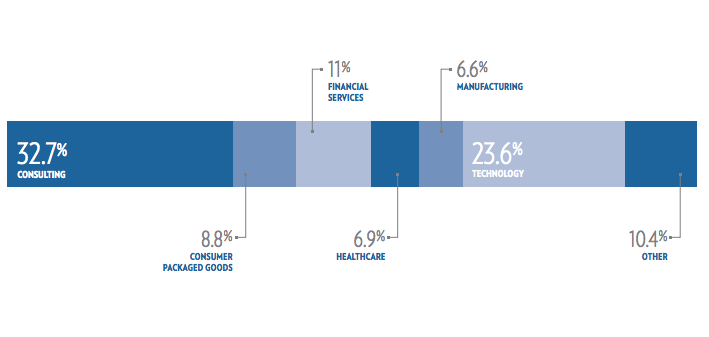 Kellogg by Industry 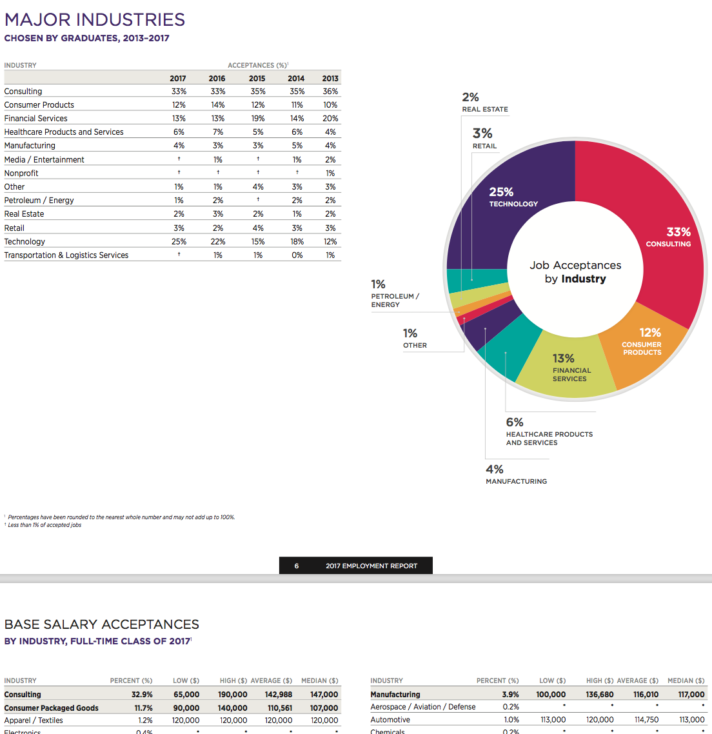 Placement is also almost identical by function, with Ross varying by function only with a higher finance placement rate—18% relative to Kellogg’s 14%. Similarly, the geographical placement is remarkably comparable, with slight differences only for the international placement for Kellogg (11%) varying from that of Ross (7.5%). Ross by Function 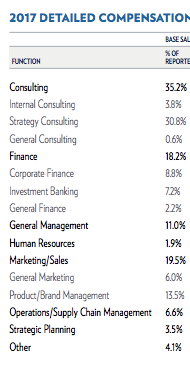 Kellogg by Function 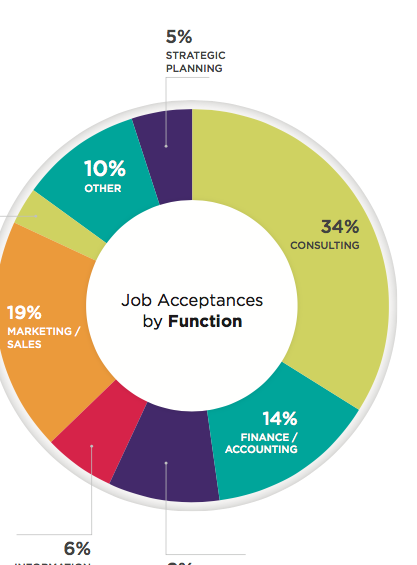 *** We hope this deep-dive comparison between the Kellogg MBA application and Ross MBA application has given you helpful intel as you make your school selection decisions this season. Finally, please leave any questions you may still have in the comment section below. Stay tuned for more Face Off posts to come! The post Face Off: Kellogg vs. Ross appeared first on Stacy Blackman Consulting - MBA Admissions Consulting. |
| FROM Stacy Blackman Consulting Blog: B-School Rejection Recovery Plan |
 This is the time of year when business schools release their final decisions. Unfortunately, it isn’t always good news. You poured your heart and soul into the arduous MBA application process. Then, when your status changes to officially denied, a b-school rejection can seem like the end of the world. For those of you feeling disillusioned by a rejection from your dream school, remember this: just 419 candidates became members of theStanford Graduate School of Business MBA class of 2020, out of 7,797 applicants. At Harvard Business School, 930 out of 9,886 applicants joined the MBA class of 2020. Getting into a top MBA program is no easy feat When the news comes in, the disappointment can feel overwhelming. It especially stings when other friends you’ve made during this process seem to receive acceptances left and right. The process of recovering from a b-school rejection has three main phases. First, there’s disbelief and devastation. Then comes soul-searching for reasons why. Finally, the resilient will actively strive to improve. Step back and give yourself a break. Starting over without taking a breather only sets you up for failure. You’re mentally fried before you even begin. Take time to regroup emotionally. Focus on friends, family, hobbies or other interests that languished on back burner over the past several months. Once you’ve come to terms with the fact that you won’t start business school in the fall, it’s time to swallow your pride and cast a critical eye on your initial application to find out why it was rejected. Go through every component to suss out any weak elements. Is your work experience too limited? Did you clearly demonstrate why an MBA makes sense at this point in your career? Have you shown why you “fit” with a particular school, and what you would contribute to the class? Did any of these red flags lead to your b-school rejection? Though it’s rarely one thing that rings a warning bell, frequent red flags include a lack of leadership skills and experience, less than stellar recommendations and low GMAT test scores or undergraduate grade point averages. Whether given intentionally or not, a lukewarm endorsement of a candidate is a definite warning sign for admissions committees. Since you usually won’t see the finished letter, it’s important to guide your recommenders by reminding them of concrete examples of your leadership skills and accomplishments. We suggest saying something like, “I want you to feel comfortable, but I also want to make it as easy as possible for you, so I put together this list of accomplishments.” If you have doubts about whether your supervisors would write you an outstanding letter of recommendation, then you may need to postpone applying to business school until you do feel confident of their support. Feedback on your weaknesses directly from the schools is, unfortunately, hard to come by. If you do have the opportunity to speak with a member of the admissions committee, take advantage by asking for details about each area of your application and make sure you walk away from any feedback session with action items for next year. Think hard about the suitability of your target schools Also, make sure you applied to the right school. Some people apply to the wrong places for them, and they’ll need to do some soul-searching before they reapply. If your scores don’t come close to those of an average student at the school, it’s not likely you’ll get in next time unless you make tremendous strides on your GMAT and have other extremely impressive qualifications, too. Finally, many schools include an additional essay question for reapplicants. This helps them better understand what has changed in your situation to make you a stronger candidate this time around. Of course you should stress your new accomplishments. But we always encourage applicants to also address any weaknesses they may have. Have an awareness of your failures and address them. Finally, be humble. Admissions committees know there’s no such thing as a “perfect” candidate, and one of the best ways to bounce back from a b-school rejection is to show how self-aware you are is by acknowledging your shortcomings. The post B-School Rejection Recovery Plan appeared first on Stacy Blackman Consulting - MBA Admissions Consulting. |
| FROM Stacy Blackman Consulting Blog: What to Do if You Hate Change and Suck at Adapting |
|
Disruption is the new normal. But if you’re not nimble enough to change course on a dime, your career may suffer. Experts agree that adaptability is essential for success at work. Companies want employees who can shift into different roles when needed and stay flexible in new situations. But what can you do if you’re a titch intractable by nature? Try these three strategies to increase your comfort level with change. With a little effort, you might become as mentally flexible as Mrs. Incredible. Learn to control your fight or flight response. “The left hand side of our brain sees change as threatening, so it triggers a fight, flight, or fright response because it involves uncertainty,” explains executive coach Glenn A. Williams, whose background in business and biology informs his views on adaptability.  Researchers say having agrowth-mindset strategy will change your ingrained negative response patterns. People automatically resist change, Williams adds, because by default they associate it with loss, rather than gain. Try to find that proverbial silver lining and recast what you’re experiencing as a positive. That way, you’ll crush those unproductive thought patterns and learn to roll with the punches. Put yourself in new, “scary” environments. Most people love routine. We find great comfort in our familiar environments and people. In fact, significant change can make us feel vulnerable and stressed out. Grow your tolerance for the unknown by putting yourself into new situations sometimes. Getting out of our comfort zone, even (or especially) if it make us feel awkward, scared, or foolish, is the key to personal growth.  You don’t have to jump out of a plane or swim with sharks to enjoy the benefits that come from having new experiences. Even something slightly out of your normal routine is enough to shake things up. It’s all about learning to feel comfortable in uncomfortable situations. And losing some of the fears that stunt your growth. Focus on the end, not the means. Many of us get super hung up on achieving things in a certain way. Maybe it’s because it has always worked in the past. Or, it could be because doing it in a different way is too hard/unproven/intimidating.  Don’t stay so attached to your plan A. Be open to considering the merits of Plans B, C and Z. When you find yourself grumbling about a new process because it’s too “out there,” remember to put your focus and energy where it belongs—on the finished product. Not the path to it. So here’s your homework: Take on a new challenge, even if it’s difficult. Keep going, even if you fail. Maintain an open and curious mind. Because adaptability as a key life skill is here to stay. The post What to Do if You Hate Change and Suck at Adapting appeared first on Stacy Blackman Consulting - MBA Admissions Consulting. |
| FROM Stacy Blackman Consulting Blog: Face Off: Columbia vs NYU Stern |
 The school selection process for MBA applicants can seem daunting. With so many highly ranked business schools, how can you decide which one is right for you? In SBC’s new blog series Face Off, we’ll tease out the strengths and differences between two similarly ranked b-schools. Plus, we’ll highlight noteworthy elements of their admissions processes. Now up: the Columbia MBA application versus the NYU Stern MBA application. How do the admissions processes differ between the two schools? Each Columbia MBA application submitted usually passes through three rounds of internal review. An admissions officer does the initial read-through. Next, a more senior admissions officer conducts a second read. Then, if both agree on the decision, it likely stands. If they disagree, it usually goes to committee. The assistant dean approves them all, but definitely trusts the readers. Not everyone goes to committee. An MBA application submitted at NYU Stern School of Business is typically reviewed in two rounds. Rounds one is by an admissions officer, and the second read is by a senior director. Applications rarely receive more than two reads. Unlike with the Columbia MBA application process, NYU Stern doesn’t have a formal “committee” that meets to discuss cases. Do both schools have a strong advantage, being located in one of the world’s best cities?  New York City’s urban business setting is definitely an advantage for many career paths, including finance. At both Columbia Business School and NYU, accessibility to recruiters and world-class industry experts/professors is unparalleled. The advantage is relative though. Here again, it’s all about fit. In recent years, our clients have pushed career goals more towards technology and consulting, less finance. Programs such as MIT, Stanford and Berkeley Haas likely have a location and recruiting advantage for a candidate interested in tech. So, the New York advantage isn’t 100% for many industries outside of finance. Both Columbia and NYU are highly-ranked, so how else should prospective MBAs judge the schools? We see that applicants almost always prioritize reputation in selecting between CBS and NYU. Brand strength is signaled by relative ranking across the major media publications, including U.S. News and World Report. CBS typically ranks in the top 5, whereas NYU usually ranks between 5 and 15 among US MBA programs. If one’s career path shows competitive rigor/leadership, complemented by strong GPA/ GMAT, the applicant will usually pursue CBS via its early decision round and consider NYU as a back up choice. Deciding which program to prioritize requires an honest self-assessment of MBA candidacy strength. Aside from rankings, MBA applicants will turn to criteria such as: student culture, specialized programs and, when available, scholarship offers. Student culture Admission trends in the recent season for NYU Stern show more flexibility with admit profiles, and this has delivered benefits to the quality of the student class. For example, we see NYU Stern more willing than CBS to accept a candidate whose employer is lesser recognized and/or whose GMAT isn’t as high.  The upside of this relative flexibility by NYU Stern is that the program tends to attract a down-to-earth, humble student class. “Any sign of competitiveness or arrogance was a turn off,” according to a former Stern admissions officer who works at SBC. “We also were sensitive to those ‘leaders’ that were pushy or always needing to lead.” Specialized programs/ recruiting Choice between NYU and CBS can be driven by the fit with particular programs. NYU’s new one-year Tech MBA and Fashion & Luxury MBA programs draw interest from specialized candidates. Media, tech, and retail are seen as stronger at NYU than CBS. CBS is the only top US full-time MBA program to offer a January intake through its accelerated program. This option is attractive for Columbia MBA application candidates eager to matriculate asap (Jan is earlier than Sept intake), such as those who are already farther along professionally. Acceptance rates are higher for the January intake of the Columbia MBA application than for the fall intake.  While historically, CBS’s January intake didn’t offer a summer internship, the program is now incorporating changes to offer professional experience concurrent to coursework. Both NYU and CBS have been trying to move away from being a ‘finance’ school and more toward a non-traditional school (e.g. social impact, tech, entrepreneurship). But each specializes in different ways. Scholarships One lesser known fact that we wish MBA applicants would prioritize: NYU is more generous than CBS with scholarship offers for highly desirable candidates. The Columbia MBA application has an ED deadline with binding deposit. Therefore, there’s less incentive for CBS to offer scholarship money to encourage yield. CBS, through its ED deadline, does not need to lure a candidate away from accepting another school. In the past season, we saw almost double the scholarship value from NYU relative to CBS. Notably, Stern offers more full tuition scholarship than CBS. These are data points for applicants to full time MBA programs who received scholarship concurrent to admit notification. Do employment outcomes differ between the two schools? CBS has slightly higher placement into consulting and finance over NYU. Notably, last year NYU had 10% more placement into investment banking than CBS. Likely this occurred because many CBS admits already had banking exposure pre-MBA. The typical finance-minded NYU admits, meanwhile, seek to go into banking after the MBA. NYU had more placement into areas that reflect the specialized programming at the school, such as Entertainment, Media, Tech and Retail. What are the top reasons to go to Columbia? 

We hope this deep-dive comparison between the Columbia MBA application and NYU MBA application has given you helpful intel as you make your school selection decisions this season. Finally, please leave any questions you may still have in the comment section below. Stay tuned for more Face Off posts to come! NYU Stern image credit: Flickr user Peterskim, (CC BY-NC-ND 2.0) The post Face Off: Columbia vs NYU Stern appeared first on Stacy Blackman Consulting - MBA Admissions Consulting. |
| FROM Stacy Blackman Consulting Blog: Admitted MBA Student To Do List |
 Has the euphoria over your acceptance to the b-school of your dreams subsided slightly? Then it’s time to refocus your energies to all of the big and little details that make up your admitted MBA student To Do List. Here are some of the specific areas that need your immediate attention. Give notice gracefully If your supervisor already supported your plans to attend business school, sharing the great news of your admission won’t be awkward at all. However, some applicants need to keep their application plans quiet so as not to jeopardize their employment. In that case, now is the time to let your employer know you’re leaving. You should explain your reasons, give plenty of notice, and offer to help train your replacement if applicable. Make every possible effort to leave on good terms in order to keep this part of your professional network intact. Set up a budget Step one of your admitted MBA student To Do List: get your finances in order. Avoid credit card debt, and save, save, save as much as you can before school starts. Forgo unnecessary purchases, and try to live slightly below your means. Remember, your projected budget should factor in expenses beyond tuition and living costs. Travel, student clubs, and study abroad trips greatly enrich the b-school experience. Make housing arrangements This aspect varies depending on the school. For example, at Harvard Business School, 80% of MBA students live on campus. Housing in residence halls at HBS is assigned by lottery. Other schools offer limited on-campus housing and refer new students to rental houses or apartment complexes nearby. Prospective students can visit apartments and houses in their new city during Welcome Weekend. But start the process early. Schools have strict deadlines for campus housing. Make sure to find out those important dates early on if you prefer to live on campus. Brush up on quant skills Business schools regularly report that a fair number of soon-to-be first-year students lack some basic quantitative skills. If that sounds like you, a quant refresh should be on your admitted MBA student To Do List. Review the course syllabus online and purchase textbooks in advance if you can. Many top MBA programs offer so-called math camps for accepted students during the summer. If you have any weak spots in this area, sign up so that you’re ready to hit the ground running once school starts. Consider a pre-MBA program A growing number of admits do pre-MBA internships to explore a new field of interest, gain training insights, and begin networking with recruiters months before the formal recruiting process begins. Others participate in short, company-sponsored programs, such as the J.P. Morgan MBA Early Advantage Program. Deadlines are fast approaching, so don’t delay if this option interests you. Still other admits take advantage of pre-term, non-academic travel programs, such as Kellogg Worldwide Experiences & Service Trips (KWEST), which unite more than 80% of incoming students through social, site-seeing and community service activities. Reach out to fellow classmates Schools often host receptions for admits where they can mingle and network with alumni and their fellow admits. Welcome Weekend is another prime opportunity to begin the process of connecting with your future cohort. If you’ve followed the MBA forums, you may already have a head start on building relationships with other admits. Find out if your program hosts a Facebook group for your class. If not, offer to help set one up. Business schools make it easy for classmates to get to know each other pre-term. Take advantage of these social opportunities and you’ll arrive on campus feeling already at home. Finally, enjoying some quiet time before things get crazy should also be on your admitted MBA student To Do List. Cross a few items off your bucket list. Connect with family and friends you won’t see much of during the next two years. Dive back into those hobbies and extracurriculars that made you a desirable, well-rounded candidate in the first place. The months leading up to the start of business school is an exciting time. But it flies by in a flash. Knowing what to expect and laying the foundation for a smooth transition to student life will make your first year less stressful and even more rewarding. The post Admitted MBA Student To Do List appeared first on Stacy Blackman Consulting - MBA Admissions Consulting. |
| FROM Stacy Blackman Consulting Blog: Don’t Play the MBA Comparison Game |
|
If Round 2 results from your dream school have come in and you didn’t get the news you hoped for, it can feel pretty devastating. After months of hard work on your application and then a few more months of anxiety-ridden waiting, finding out that you weren’t accepted really stinks. When you already feel confused, down or angry, learning that a friend or co-worker did get in feels like having salt poured in your proverbial wound. If you believe you’re actually more qualified than that person, it’s even worse. That’s when many dinged applicants start to play the MBA comparison game. Why do scenarios like this come to pass? How can two people who work at the same place or are similar “on paper” meet such different MBA fates? How can a stellar candidate receive a ding when a seemingly so-so applicant gets admitted? Let’s break it down. The MBA application process is subjective. Admissions committees consider thousands and thousands of qualified applicants each year. They’ve developed a strong sense for who will fit best with their program. While you may think you’d be more of an asset to a certain school than an acquaintance who got in, the admissions committee felt differently. You don’t know absolutely everything about your friend or co-worker’s candidacy. If you did your homework on the MBA process, you know that AdComs are looking for what makes applicants tick. They want to understand your personality. They are interested in more than just your career experience and “stats.” Even if you read your friend’s essays, you probably don’t know every single detail of their applications and recommendation letters. Nor do you know they performed in their interview. Maybe your demographics, backgrounds and motivations don’t overlap as much as you might have thought. Perhaps the AdCom saw something specific in your friend that they were looking for. You may not have even been competing with your friend for a spot in the first place. As alluded to above, we know that each program strives to put together a diverse class of impressive people. However, no one knows the magic formula that any given AdCom uses to fill open spots. But what we do know is that it’s not as straightforward as most applicants assume—meaning that everything from your gender to your industry to your nationality to your career aspirations, community service and personality comes into play when an AdCom attempts to build a graduating class. We know how tempting it is to play the MBA comparison game. But unfortunately, doing so won’t change anything or make you feel any better. The best thing you can do is try to be objective about how you could improve your candidacy if you reapply next year—or consider additional programs that might improve your odds. Think of it this way: 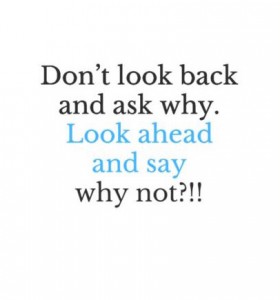 ***Do you want to stay on top of the application process with timely tips like these? Please subscribe to our weekly newsletter and you’ll receive our expert advice straight in your mailbox before it appears on the blog, plus special offers, promotions, discounts, invitations to events, and more. The post Don’t Play the MBA Comparison Game appeared first on Stacy Blackman Consulting - MBA Admissions Consulting. |
| FROM Stacy Blackman Consulting Blog: Face Off: Wharton School Vs Chicago Booth |
 The school selection process for MBA applicants can seem daunting. With so many highly ranked business schools, how can you decide which one is right for you? In SBC’s new blog series Face Off, we tease out the strengths and differences between two similarly ranked b-schools. Plus, we’ll highlight noteworthy elements of their admissions processes. First item of business: the Wharton MBA application versus the Chicago Booth MBA application. How do the admissions requirements and selectivity compare between the Wharton School and Chicago Booth? From an application perspective, Booth’s application gives candidates a lot more freedom to be themselves. It also has a more holistic approach. Meanwhile, the Wharton MBA application reflects a more structured approach. Overall, the Wharton School is more selective than Chicago Booth. Almost every applicant accepted into both chooses Wharton, according to our data here at Stacy Blackman Consulting. Given Wharton’s higher yield, Booth is known to take a very personal approach to its application process. It wants to make sure its candidates are committed. “Show up, engage, make yourself known. Showing up means a lot to Booth. They track the frequency in their system. This is true for all applicants, but especially over-subscribed candidates,” shares a former Booth Admissions Officer on the SBC team. Admission trends in the recent season for Booth show more flexibility with admit profiles. This should reflect a student class that is more diverse by industry, academic records and employer history. The program tends to attract a more collaborative student class. After all, collaboration is a cornerstone of Chicago Booth’s pay-it-forward culture. Meanwhile, the Wharton MBA application tends to attract a more competitive pool. Therefore, the MBA experience will reflect this intensity. Still, the team-based discussion component of the Wharton MBA application exists for a reason. That is, to weed out folks who clearly can’t play well with others. The Wharton group interview offers a preview of the energy prospective students will step into on campus from day one. How do the MBA curriculums compare, given that both are known to be quant-oriented? A study on GMAT Club drew the following conclusions: Curriculum, faculty, brand, and robust student culture are Booth’s major strengths. Wharton, meanwhile, primarily relies on its brand, alumni network, and career opportunities. About 82% of students say Booth’s curriculum and professors are its core strengths. Compare this to the 64% of students who say brand Booth and student culture are its major strengths. We often hear from applicants in forum discussions that they apply to Booth primarily because of its flexible curriculum and student culture. There is a perception that they are “finance schools.” How do the career outcomes between the schools stack up? Industry placement is comparable per the data points below:
Both programs consistently rank in the top 7. They offer a comparable education. Principles in accounting, finance, and marketing are basically the same at both Wharton and Booth. The difference between the programs is perception. The Wharton brand holds more cache globally. As a result, Wharton attracts a stronger student class. It also has higher yield rates, applicant volume, and average starting salary. Says Stacy Blackman, “A few years ago, the elite candidates were only applying to HBS and GSB. Wharton has found its way to the trifecta.” Booth isn’t at this level by perception. But, fit is everything. Integral to fit is student culture and post-MBA career location preferences, which vary between the programs. Both schools have high-caliber cohorts. Wharton tends to attract a more competitive applicant pool, so the MBA experience will reflect this intensity. The upside of this relative admit flexibility (compared to Wharton) by Booth is that the program tends to attract a more collaborative student class. “Wharton is a *hyper*-social environment. From day one, there is constant activity and a never-ending social calendar. Extroverts will love it. Introverts with strong social skills will find a balance that works for them. But introverts without social graces would find it stifling,” shares a former Wharton Admissions Officer who now works at Stacy Blackman Consulting. To conclude, the key differences between the programs may be:
The post Face Off: Wharton School Vs Chicago Booth appeared first on Stacy Blackman Consulting - MBA Admissions Consulting. |
| FROM Stacy Blackman Consulting Blog: Key Career Benefits of an MBA |
 Business school graduates benefit from more than just a solid return on investment through substantial salary increases. They also deepen the knowledge, skills and abilities they will need for future professional success. Here are just four of the key career benefits of an MBA program. Transferable skills Business school gives you new skills and knowledge that will turbocharge your career. MBA students often set their sights on a job in finance or consulting. But the hard and soft skills acquired during an MBA program can transfer to myriad other roles. Today’s MBAs work in tech, health care, consumer goods, government and nonprofits, and many other industries. An MBA strengthens your leadership ability, intellectual creativity, critical thinking, cross-cultural awareness, communication, and even greater IT mastery. These skills will serve you well as you move toward your ultimate career goal. You may start out at a financial firm such as Morgan Stanley and learn a tremendous amount about banking and analysis before deciding that it’s not a good fit, as happened with our client, May. She built upon those skills when she eventually became involved with running a business as a gourmet food importer. With a deeper understanding of the complexities of the business world, those problem-solving skills mastered during your MBA will carry over to your next position, and the one after that, too. Higher employment rates Increased job security with your current employer or within your current industry is another of the key career benefits of the MBA. The degree is also a powerful differentiator in a crowded marketplace. Recruiters have said that some of their corporate clients will not consider any candidate without an MBA.  This shows just how much business leaders value this qualification. Employers believe it vets potential hires. You can safely assume a graduate from Harvard Business School or the Wharton School is going to bring considerable skills and business acumen to the job from day one. Without a doubt, companies appreciate managers who have risen through the ranks, know the business inside and out and can get the job done. But they also like hiring MBAs for their ability to handle complex situations. They can act nimbly and adapt in the face of a rapidly changing global environment. As outsiders, MBA hires bring in a broad or fresh perspective. They see how to improve inefficiencies or come up with innovative solutions to business problems. Degree specializations Many MBA programs offer specializations or concentrations that provide a deep dive into the nuances of a particular industry. Here, students can sample a few different career paths to see whether it’s a good fit before taking the plunge. Adding a concentration is a good move for people who know exactly what they want to do with their career. If you already know that you’re interested in something really specific, such as digital marketing, real estate, business analytics, social innovation, health care and so forth, earning an MBA with a concentration can make you even more marketable. In today’s competitive job market, listing a concentration on your resume helps you stand out. Career switchers, however, would be better off focusing on a general business education instead. Networking opportunities At business school, you’ll interact closely with talented individuals from all over the globe, which enhances the experience by exposing you to different business practices, cultures and points of view.  The connections you make are, for many, one of the most valuable key career benefits of an MBA. Make sure you capitalize on the opportunities in and out of the classroom during your MBA studies. Your alumni network helps you stay connected to the university as well as to countless professional opportunities you can tap into throughout your career. When you’re spending two years of your life and paying more than $100,000, it’s the network of contacts you build that make your MBA experience truly priceless. The post Key Career Benefits of an MBA appeared first on Stacy Blackman Consulting - MBA Admissions Consulting. |
| FROM Stacy Blackman Consulting Blog: The Upside of Working with a Competent Jerk |
 As the saying goes, you can’t choose your family…or your coworkers, either. In multiple studies, people say they would rather work with lovable fools than accomplished a-holes. But what if your own fortunes were tied to the performance of that other person? When real money is on the line, it seems we actually prefer working with/for a highly competent jerk. Stanford professor Jeffrey Pfeffer and his coauthor Peter Belmi of the University of Virginia recently published a paper focused on how “reward interdependence” affected whether participants cared more about likability or competence. They found that when your paycheck depends on a coworker’s capabilities, your first instinct is to protect your own interests. In fact, a whopping 83% of those surveyed chose competence over social warmth. Because duh, you want your team to go to the playoffs. Organizations hire employees for their skills and ability to improve the bottom line. Lovable fools make the workplace more enjoyable, but they can also become a liability that undermines the company’s long-term success. “If you’re building a baseball team, you don’t care whether a player is nice — you want to know if he can hit the ball,” Pfeffer says. “If you’re looking for a surgeon, you don’t ask about personality.” A highly competent jerk brings home the bacon, so supervisors will often overlook their EQ shortcomings. It’s worth noting that competent jerks can become socialized—niceness is a skill like any other. INSEAD Professor Miguel Lobo notes that this type of employee responds to incentives better than anyone else. “By saying ‘Look I’m not asking you to be a nice person but having good working relationships is a skill and a professional asset like any other’. You have to make them see it as a goal they need to achieve and reward them for doing so.” Who knows, today’s competent jerk just might become tomorrow’s lovable star. In an ideal world, we would work only with nice people who share our beliefs and values. Last time we checked, we don’t live in an ideal world. “If there aren’t any consequences, then of course you are going to prefer people who are likable and fit your norms of social desirability,” Pfeffer says. “But if your success depends on how well those people perform, which is the case in many organizational settings, then you’re going to emphasize competence.” You can take that to the bank. This post originally appeared on our awesome newsletter, the Blacklight. For more great stories, advice, and insights for professionals, sign up today! The post The Upside of Working with a Competent Jerk appeared first on Stacy Blackman Consulting - MBA Admissions Consulting. |

|
|